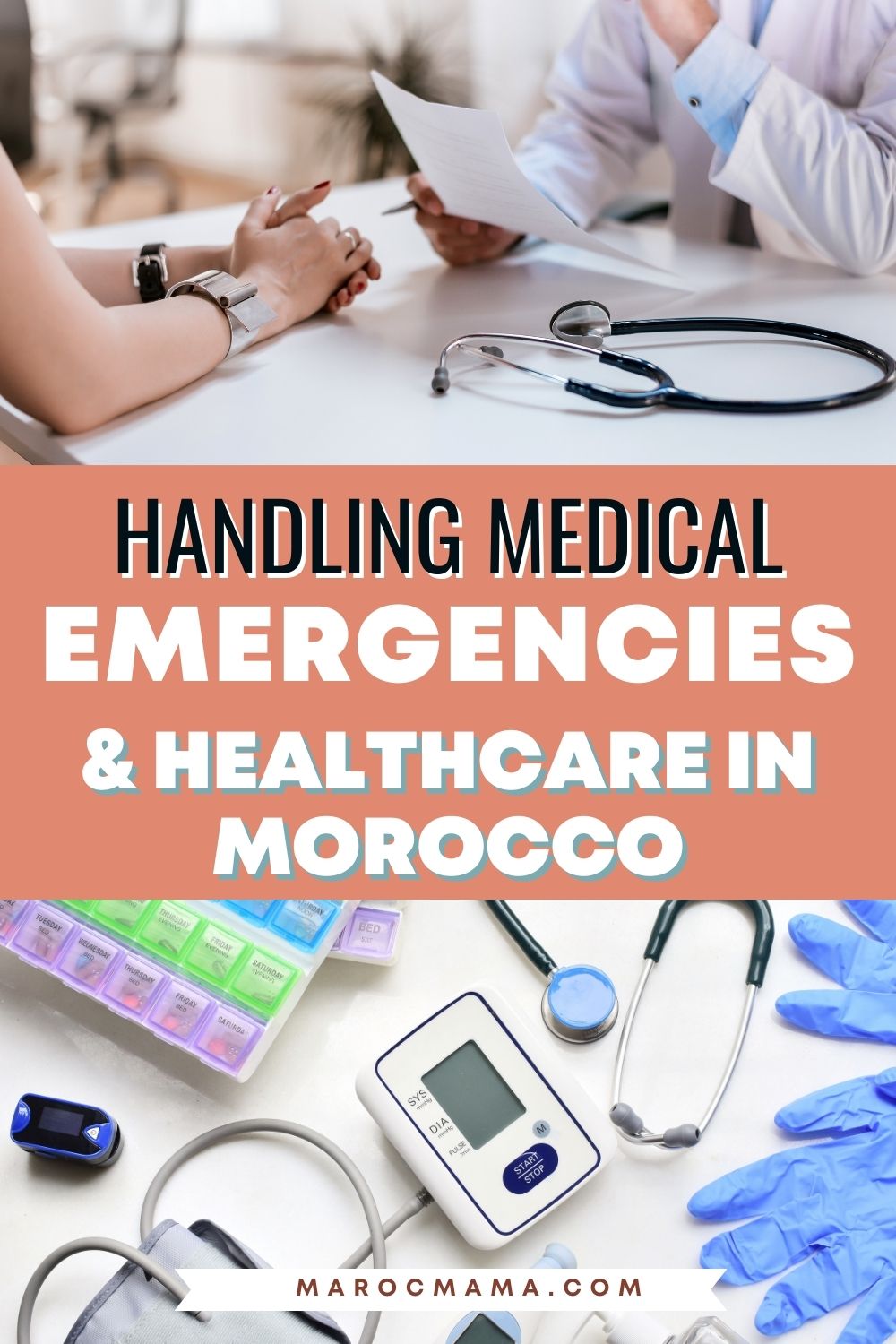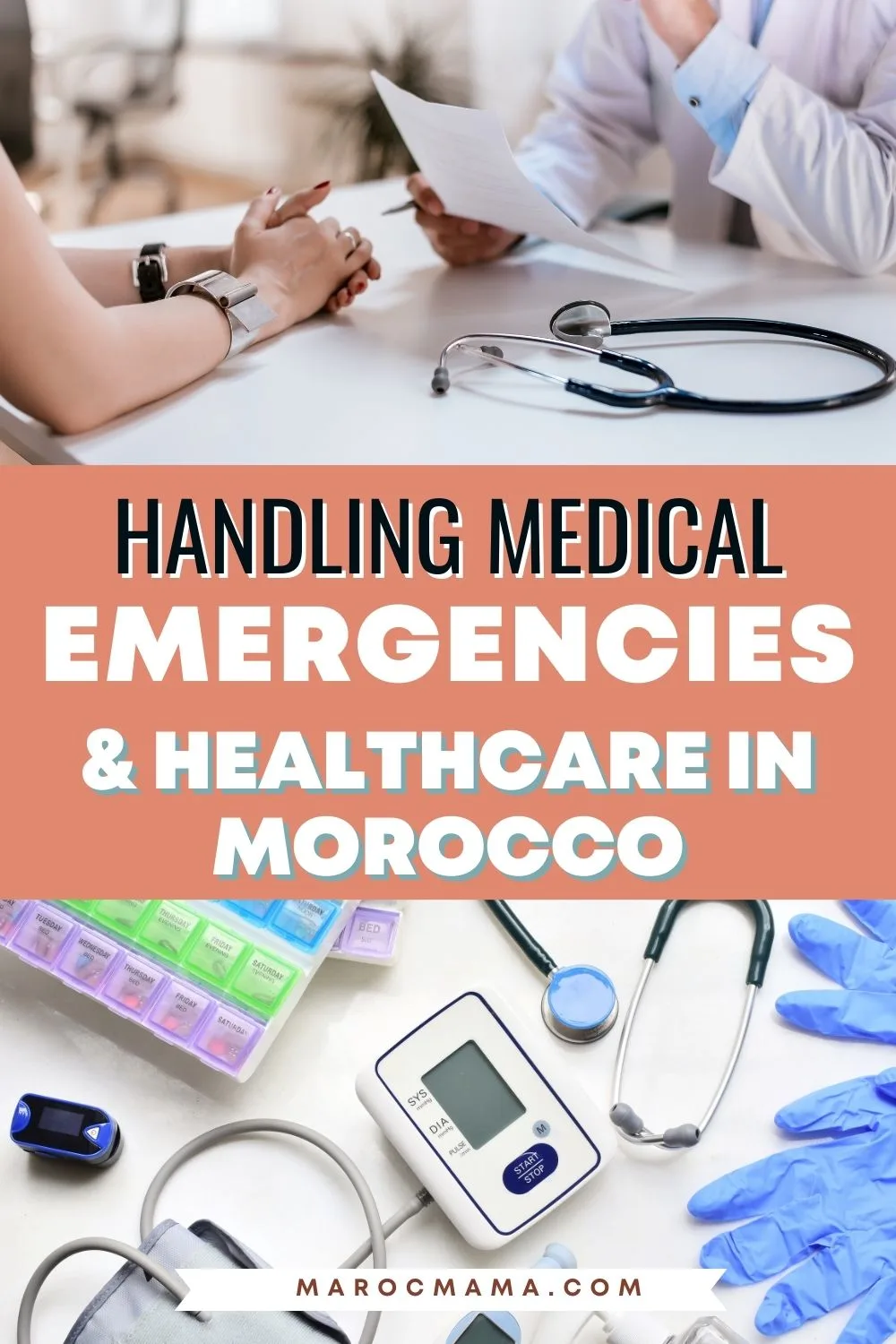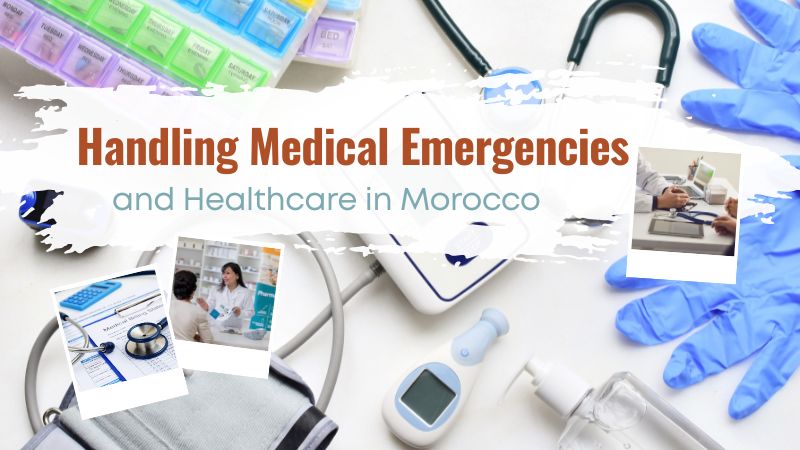What’s your worst travel fear? For most people, it’s getting sick or having a medical emergency far from home. But, when you choose to make your home in a foreign country, understanding and using the medical care system can be even more intimidating and frightening. Navigating healthcare in Morocco can be a unique challenge, but with some knowledge and preparation, you can handle medical emergencies and routine care with confidence.
Many people ask me about healthcare in Morocco. The first year we lived in Morocco, I went back to the US a few months later for a medical situation. We had only been in Morocco for a month when I started getting sick. After arguing about going to the doctor for weeks, MarocBaba finally took me in—and we discovered I had a lot of small gallstones. Because of my previous gastro-surgery and because we still had insurance coverage in the US, I went back to have surgery.


Later on in the year, our youngest son was ill for a week and did not get any better. After taking him to the doctor, we learned he needed to have his appendix removed. We were left wondering, should we do the surgery here? Should we buy tickets for the next day or two and one of us fly back to the US with him to have it done? What should we do? Ultimately, we chose to have the surgery in Morocco.
I want to preface the remaining portions of this by saying there are many very skilled, qualified doctors in Morocco. Many have trained in Europe and the United States, and there is access to equipment, procedures, and medications that are the same or comparable to what you would find in those countries. But it comes at a price, and there can be many hurdles.
I can’t compare what medical service is like in Europe as I’ve never experienced it, so my observations are based on my experiences in Marrakech, Morocco, and the United States.
Healthcare in Morocco
Morocco has a two-tiered medical system. There is universal public healthcare as well as a private healthcare system. The public healthcare system is dismal, at best. It may be better than no healthcare but should really not be considered if at all possible. The private system is a pay system. There are some health insurance plans in the country to help with costs, and some will accept international insurance plans. By Western standards, care is very affordable. An office visit can cost between $10-15, medications a few dollars, and an operation $500+.
Routine Medical Exams
If you need a check-up, are ill, or have a specific concern, there are general practice physicians and specialists in any area available. Some doctors only take patients by appointment, while others take walk-ins. Either way, the general procedure for appointments is “do you want a morning appointment or afternoon?” There are no specific times.
If you have a morning appointment, you show up when the office opens (or when you want in the morning) and are taken on a first-come, first-served basis. Afternoon appointments work the same way but after lunch hour.


If you need an x-ray or blood work, you will leave the office and go to a special location that does this. The doctor will give you the information on where to go. You’ll need to have the workup done, wait for the results (a few hours or maybe the next day), and then bring it back to the doctor to be read. For any prescriptions, you’ll be written the order on paper and can bring it to any pharmacy to be filled.
Pharmacies
Pharmacies are easy to identify in Morocco; they are marked with a green crescent or plus sign. One difference in Morocco is that you can’t buy things like ibuprofen over the counter—you’ll need to ask for it from the pharmacist.


Need some antibiotics? Just go ask! There are lots of medications that a pharmacist can dispense without a prescription, so if you know what to ask for, you likely will be able to get it without a doctor’s visit—unless it’s a controlled medication or narcotic drug. If you are feeling under the weather and it’s not urgent, you might try this route first.
Staying in Hospitals
Hospital services and care will vary depending on the hospital. In Morocco, they’re known as cliniques. If you need to go in for a procedure or operation, there are several things I found very different.
First, you need to supply almost all of your own things like a drinking cup, bottled water, towels, Kleenex, sheets (yes, they have sheets, but apparently bringing your own blankets is needed), and pillows. I’m not sure how much this is for comfort vs. required. This will vary from location to location.
Unless you request it, pay extra, and make a big fuss, you won’t get a single room, even if you’re with a child. If you’re alone, this might not even be an option. When I was considering my surgery, I was told my husband would not be permitted to stay overnight with me. A scary prospect when you’re sick, can barely speak the language, and are drugged up.
On the other hand, when my mom was visiting and ill, we went to the same hospital and after making it very clear that one of us was going to spend the night with her, they relented and gave us a room that I could stay in with her.


You should also be prepared for very different cultural practices in care. For example, you won’t get ice chips—ever. After our son’s surgery, he wasn’t permitted to drink anything, not even a swab of water in his mouth, for almost 16 hours. I found this very strange and can’t say I followed the recommendations.
In the US, after surgery, the nurses and doctors would have you up and walking as soon as possible; here, they were more than happy to prolong movement as long as possible. I had to push and push to get help to get our son up and moving around.
If you need medications that aren’t given through the IV, someone may need to go to the pharmacy to get them for you and bring them to the room.
You’re kind of on your own. I found nurses are much less about helping patients or caring for patients than performing routine job functions. They’re there to serve some basic purposes but aren’t in the field to care for or comfort patients. Non-IV medications were not administered by nurses—we had to give them to him. It is very important and helpful to have someone with you to act as your advocate, especially if you are very ill.
On the plus side, nurses don’t bother you every two hours to take your vitals. A bit more restful night of sleep.
Recovery time is very pronounced. Our son stayed home from school for two weeks after his appendix surgery. Two weeks!
Follow-up care is often included in the hospital bill. We went back to the hospital twice to have his wound cleaned, the bandage changed, and the doctor checked it. We then had an office visit to have his stitches removed. These were included in the surgery price. Make sure to ask about this when you pay.


Speaking of money, the hospital bill is due at the time of discharge. All of it. There may be some type of payment arrangement system, but in general, it should not be expected. Expect to pay cash on the spot.
I have to touch on one other point because it’s something I’ve carried with me after my son’s surgery. If you’re somewhere that your in-laws also live, they’re going to be in your business.
This is a very big cultural difference.
My son had surgery later in the evening after a full day of doctor’s visits and running around. We were stressed out, scared, and worried. The very last thing I wanted was a room full of people when he came out of surgery. Even though I begged and begged that they stay home, guess what happened? A room full of people.
I’ve learned this is their way of showing they care. But, I felt incredibly disrespected as a person and a parent. My sister-in-law went with us to the doctor’s appointments and pre-operative discussions with the doctors. To me, this was frustrating because the doctor and attendants did not include me in any conversations, instead directing the conversation to my husband and sister-in-law, completely excluding me.
I’m sharing this because cultural differences are very real, and when your child is sick (or you’re sick), the last thing you want is surprises. It often feels like as the outsider you’re expected to shoulder the differences and “suck it up” and not the other way around. I have no resolution for this experience, and it still makes me upset. I don’t feel like I should be expected to just accept things because I’m an outsider, especially when it concerns my child.
While our experience was very different from what I was used to, I felt that the doctor was competent and don’t regret having done the surgery here. It would have cost us a small fortune to go back to the United States to have the same procedure done. I know next time I will be more prepared and know what to ask and what to expect.
Learn More About the Moroccan Culture
Need Travel Insurance for Your Trip to Morocco? Check rates for your upcoming adventure!














